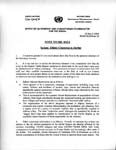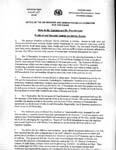| 2003 | 2004 | 2005 | 2006 | 2007 |
2003 |
||||
| JANUARY Just as Peace Nears, a New Civil War Starts -- in Darfur |
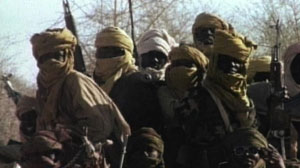 Rebel militiamen mobilize in Darfur. Negotiations are about to start in Sudan to end a two-decade North-South civil war between the largely Muslim Khartoum government in the North and the predominantly Christian population in the South. But a new conflict breaks out in Sudan's Western region -- Darfur -- where rebel groups have emerged to claim a share of Khartoum's new oil wealth. Rebels attack government facilities and Sudan's regime begins bombing the area and arming a proxy militia, the Janjaweed, to attack the rebels and black civilian farmers in Darfur in a stampede of brutality. By April, refugees begin streaming into neighboring Chad. |
|||
| Summer Early Warnings of a Growing Humanitarian Crisis |
Among Darfur's refugees, there are thousands of stories of rapes and killing by the Janjaweed. These reports convince the U.N. humanitarian coordinator in Khartoum, Mukesh Kapila, that a systematic, government-sponsored campaign of atrocities is being conducted against civilians. |
|||
| Fall The World Hesitates to Act |
Kapila confronts the government in Khartoum about the atrocities and is met only with denials. Kapila meets with foreign ministries in the West urging action, but is met with some cynicism or skepticism; many hesitate because they don't want to jeopardize the shaky progress being made to end Sudan's long North-South civil war. Kapila also is having difficulty getting action from U.N. leaders. Through 2003 and 2004 Kapila will write dozens of memos to Jan Egeland, the United Nations' head of humanitarian affairs, and to others, outlining Darfur's situation and calling for action by the United Nations' Department of Political Affairs. On Dec. 5, Egeland calls Darfur "one of the worst humanitarian crises in the world.” |
|||
2004 |
||||
| January-February The Mounting Evidence |
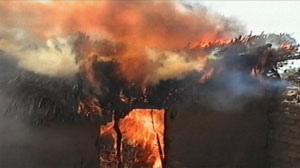 A Darfurian hut burns during an attack. A Sudanese military offensive forces an estimated 18,000 more refugees into Chad. There are now some 600,000 displaced civilians in Darfur and another 95,000 in Chad. In February, Sudan allows U.N. humanitarian workers into some areas of Darfur. According to journalist James Traub, "There could be no more doubt about the scale or nature of the atrocities: Aerial photographs showed villages burning across the region; a staff member had seen Janjaweed fighters rape 120 women, one by one; others had seen government helicopters drop off reinforcements and pick up wounded militia." |
|||
| March Kapila Goes Public |
Frustrated at the lack of response from his U.N. superiors, Kapila tells BBC Radio 4: "It is more than just a conflict. ... This is ethnic cleansing, this is the world's greatest humanitarian crisis, and I don't know why the world isn't doing more about it." |
|||
| April 7 10th Anniversary of Rwanda's Genocide |
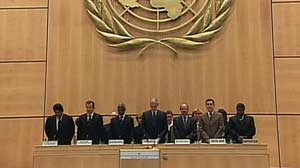 Kofi Annan joins members of the U.N. Commission U.N. Secretary-General Kofi Annan uses this commemoration to threaten Sudan if it continues to thwart humanitarian access to Darfur. "The international community cannot stand idle. … [T]he international community must be prepared to take swift and appropriate action. By 'action' ... I mean a continuum of steps, which may include military action." (Read Annan's speech.) |
|||
| April The Seesawing Continues |
Kapila and others work to put pressure on the Security Council to raise the Darfur issue, but there is no interest in doing so. Instead, the council issues a presidential statement, a document that doesn't carry the force of a resolution, but merely summarizes the feelings of the council. According to James Traub, the statement "is very lukewarm because Pakistan, Algeria, China, Russia and others on the Security Council are unwilling to criticize the [Sudanese] government." The statement expresses the council's "deep concern about the massive humanitarian crisis" and calls on "the parties concerned to fully cooperate in order to address the grave situation prevailing in this region, to ensure the protection of civilians, and to facilitate humanitarian access to the affected population." |
|||
| July Darfur Reaches the U.N. Security Council |
Security Council Resolution 1556, introduced by the United States, is passed in July -- with China and Pakistan abstaining. The resolution raises the possibility of the council using "measures as provided for in Article 41" of the U.N. charter, which could include sanctions, but stops short of threatening sanctions explicitly. Sudanese President Omar al-Bashir and Kofi Annan issue a joint statement promising to disarm the Janjaweed and granting access to human rights monitors. The U.S. Congress passes a unanimous resolution calling the situation in Darfur a genocide, and the U.S. government launches an inquiry into the violence. |
|||
| September Political Realities |
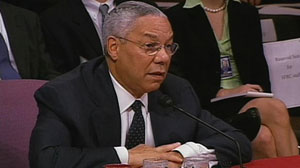 Colin Powell addresses the U.S. Senate Citing conclusions of the U.S. inquiry, Colin Powell testifies to a Senate committee "... genocide has been committed in Darfur and the government of Sudan and the Janjaweed bear responsibility and that genocide may still be occurring." The same day, President Bush affirms Powell's statement. More than any other power, the U.S. has been pushing for meaningful action against Sudan, but its standing is weakened in the eyes of many U.N. members by its show of force in Iraq. In addition, Sudan has powerful allies. Russia, accused of committing atrocities in Chechnya, is in a difficult spot when it comes to criticizing another U.N. member for brutally suppressing a rebellion. And China has a particularly close tie to Sudan: It is a major buyer of Sudan's offshore oil. In September, the U.N. Security Council passes Resolution 1564, which explicitly threatens sanctions if Sudan doesn't stop the violence. China, Russia, Algeria and Pakistan abstain. The next day, Sudanese President Bashir says "We are afraid neither of the U.N. nor of its resolution." He nonetheless promises to comply with demands that the government reestablish security and disarm the Janjaweed, but says the resolution is "unfair and unjust" and insists that the militias are beyond government control. |
|||
| December A Year of Tragedy and Stalemate |
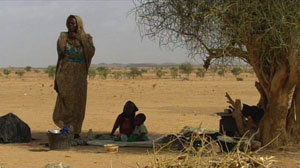 Refugee women and children take up shelter Over the course of 2004, another 1 million people in Darfur have been displaced and in every month of the year, at least 6,000 people have been killed. By the end of 2004, the Security Council has passed four resolutions on Darfur. Sudan ignores them all and suffers no consequences. |
|||
2005 |
||||
| Jan. 9 North-South Civil War Reaches Peace Agreement |
After two years of troubled negotiations a peace agreement is signed in Sudan's 21-year North-South civil war, one of the world's bloodiest conflicts. |
|||
| Jan. 25 Is It Genocide? |
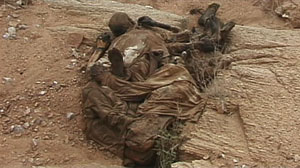 The bodies of victims killed in a Janjaweed attack. The U.N. International Commission of Inquiry on Darfur releases a 176-page report (PDF file), concluding that genocide is not occurring, but that massive human rights violations are being perpetrated by the government, rebels and militias. In parsing whether the term "genocide" should be applied, the report states: "Generally speaking the policy of attacking, killing and forcibly displacing members of some tribes does not evince a specific intent to annihilate, in whole or in part, a group distinguished on racial, ethnic, national or religious grounds. Rather, it would seem that those who planned and organized attacks on villages pursued the intent to drive the victims from their homes, primarily for purposes of counter-insurgency warfare.” The report recommends referring Darfur to the International Criminal Court. |
|||
| February-March A Dismal Picture |
In February, U.N. Special Envoy to Sudan Jan Pronk tells the Security Council that Darfur is a "dismal picture" and says a much larger peacekeeping force is needed than the small African Union force already deployed. In March, the Security Council passes Resolution 1591, imposing a travel ban and asset freeze on certain individuals implicated in the violence in Darfur. Algeria, China and Russia abstain. That same month, U.N. Resolution 1593 refers "the situation in Darfur ... to the Prosecutor of the International Criminal Court ..." The United States, China, Algeria and Brazil abstain. |
|||
| September A Bold New Doctrine |
The U.N. "Responsibility to Protect" doctrine is adopted by the General Assembly at the 2005 World Summit, capping a five-year campaign by the Canadian government. It states a nation can't hide behind its sovereignty when crimes against humanity are being committed within its borders; the world community has the right and responsibility to intervene -- using force if necessary. |
|||
| December Seven More U.N. Resolutions |
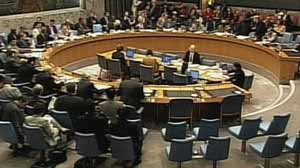 The chamber of the United Nations Security Council. By the end of 2005, seven more Security Council resolutions on Darfur have been passed, including initiatives to increase the numbers of the small African Union peacekeeping force deployed in Darfur in 2004. But every effort to strengthen the under-funded and under-equipped force fails. |
|||
2006 |
||||
| The Growing Refugee Crisis |
In April, Chad severs diplomatic ties with Sudan, accusing Khartoum of complicity in a rebel attack on Chad's capital, N'djamena. There are now some 200,000 Sudanese refugees in Chad. |
|||
| Aug. 31 Another Stillborn U.N. Resolution |
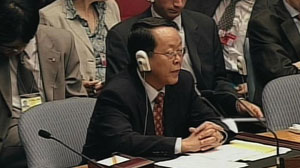 Chinese Ambassador Wang Guangya. The Security Council passes Resolution 1706 -- one more attempt to increase the African Union peacekeeping force from 7,000 to more than 20,000 troops. But the resolution is ineffective by design: China agrees not to veto 1706 as long as it includes the clause "invites the consent of the Government of National Unity for this deployment," meaning the troops could go only if Sudan agrees. And in the end Sudan declines. |
|||
| November-December Three Years into the Genocide, and It's Getting Worse |
The violence spreads into neighboring Chad. In one month, Janjaweed militia cross Sudan's western border and destroy some 60 villages in Chad. The border has become a danger zone for everyone, including unprotected refugees and humanitarian aid workers struggling to deliver relief. In 2006 alone, eight more Security Council resolutions have been passed on Darfur, and none have stopped the killings. |
|||
2007 |
||||
The Grassroots Movement |
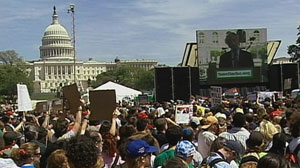 Darfur activists hold a rally in Washington, D.C. Pressure on the international community to take more decisive action continues. There is now a large grassroots movement that includes the U.S.-based Save Darfur Coalition, founded by Jewish groups and now including evangelical Christians and Muslims, plus anti-genocide and humanitarian organizations. The movement is spending its $15 million budget not on humanitarian aid, but on publicizing the crisis and lobbying for political change. The movement has had results: persuading 54 universities, 20 states and 9 cities to restrict their investments in Sudan and in the Chinese oil companies that operate there. Public pressure is also credited with the Security Council's 2005 decision to refer the situation in Darfur to the International Criminal Court at the Hague. |
|||
| March-April More Terror on the Ground |
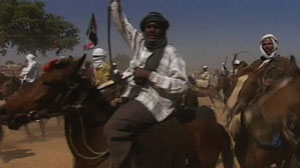 A gang of Janjaweed militiamen. A cross-border Janjaweed raid kills between 200 and 400 people in Eastern Chad, displacing another 8,000 to 10,000 people. And The New York Times reveals confidential U.N. information and photos indicating that "the government of Sudan is flying arms and heavy military equipment into Darfur in violation of Security Council resolutions and painting Sudanese military planes white to disguise them as United Nations or African Union aircraft." |
|||
| Summer Small Flickers of Hope? |
President Bush announces the tightening of economic sanctions against Sudan and calls for an international arms embargo to end the killing. But the U.S. is still isolated. China and other Security Council members criticize the sanctions and refuse to go along. However, Darfur activists have finally found a way to get the attention of China. They are targeting the Beijing Olympic Games, which activist Eric Reeves calls "The Genocide Olympics" in an effort to shame the Chinese government for its support of Sudan. And at last, after four years of efforts, the U.N. Security Council in July finally unanimously passes Resolution 1769, authorizing the deployment by the end of 2007 of 26,000 U.N. peacekeepers in Darfur to protect civilians. But while Sudan has finally agreed to accept a substantial peacekeeping force, it demands that the troops be predominantly African and that they have no mandate to disarm the Janjaweed. On Aug. 24, Amnesty International releases photos that it claims show that "the Sudanese government is continuing to deploy offensive military equipment in Darfur" in "breathtaking defiance of the arms embargo ..." Editor's Note: As of FRONTLINE's November 2007 broadcast of this report, at least 200,000 people have been killed, 2.5 million driven from their homes, and mass rapes have been used as a weapon in a brutal campaign -- supported by the Sudanese government -- against civilians in Darfur. | |||
home . introduction . watch online . chronology . interviews . analysis . join the discussion
producer's chat . readings & links map . site map . dvd & transcript . press reaction
producer's journal . credits . privacy policy . journalistic guidelines . FRONTLINE series home . wgbh . pbs
posted november 20, 2007
FRONTLINE is a registered trademark of wgbh educational foundation.
main photograph © corbis, all rights reserved
web site copyright WGBH educational foundation
